A wakeup call to Democrats and Republicans: Hispanic voters are not apathetic, they’re unconvinced
UnidosUS, the nation’s largest Hispanic civil rights and advocacy organization in the U.S. with a network of nearly 300 community-based organizations, and Mi Familia Vota, a national civic engagement organization with the most extensive Latino field operation, recently released a major poll of Hispanic voters that highlighted a seismic shift among some of the priorities of this electorate, and which could decide control of Congress this Fall.
There’s no question that Latino voters will play a crucial role in major battleground states this November – states like Arizona, California, Colorado, Florida, Georgia, Nevada, Pennsylvania, and Texas – and two national outlets recently reported on Latino voters’ attitudes about specific policy matters, as well as their feelings on which party is best-suited to address major concerns and priorities:
Keep up with the latest from UnidosUS
Sign up for the weekly UnidosUS Action Network newsletter delivered every Thursday.
Majority of Latino Voters Out of G.O.P.’s Reach, New Poll Shows
“How Latinos will vote is a crucial question in the November elections and for the future of American politics. Hispanic voters are playing a pivotal role in the battle over control of Congress, making up a significant slice of voters — as high as 20 percent — in two of the states likeliest to determine control of the Senate, Arizona and Nevada. Latinos also make up more than 20 percent of registered voters in more than a dozen highly competitive House races in California, Colorado, Florida and Texas, among other states.” [New York Times, 9/18/22]
Latino Voters, Once Solidly Democratic, Split Along Economic Lines
“Latino voters are among the fastest-growing groups in the electorate, accounting for some 16 million voters in 2020—or more than 10% of the voter pool. Once a solidly Democratic bloc, Latino voters are emerging as a swing group available to both parties, with its voting preferences splitting along economic and class lines.” [Wall Street Journal, 9/14/22]
These two articles raise important points, but the reality of Hispanic voters’ attitudes is complex. Both political parties need to engage the Latino electorate in a more meaningful and sustained manner. Clarissa Martínez De Castro, Vice President, UnidosUS Latino Vote Initiative, recently put both parties on notice that they’re not doing enough when she said:
“Latino voters are not apathetic, they are unconvinced. They are sending a wake-up call to both parties, which remain underwater compared to previous peaks in Hispanic support and persist in their chronic under-engagement and under-investment in these voters.”
Democrats and Republicans have failed to contact Hispanic voters in a timely and/or consistent manner, and continuing to do so will be at their own peril. This point was made clearer by the results of a recent tracking poll of Hispanic voters by NALEO Educational Fund, which showed that one-third of Latino voters plan to vote on election day, while the remaining two-thirds are evenly split between planning to vote early or by mail. Thus waiting to do outreach until the last minute would miss a majority of those casting a ballot. Héctor Sánchez Barba, Executive Director and CEO of Mi Familia Vota, sent a strong message to politicians when he said:
“To turn out Latino voters, both parties must invest in reaching our community like they would any other valued constituency. Sadly of those polled, only 29% and 19%, respectively, say Democrats or Republicans have contacted them.”
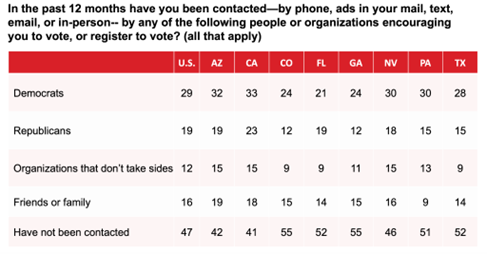
We want to take you directly to the source. A recent, extensive national survey of nearly 3,000 Latino voters, conducted by UnidosUS and MFV, gives insight into the attitudes and preferences of the Latino electorate.
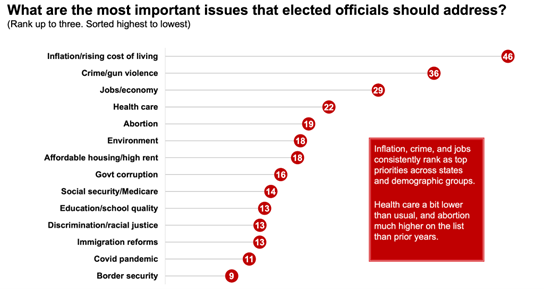
As you can see from the graph above:
- Inflation and jobs are the #1 and #3 priorities, findings that track with long-standing Latino concerns about the economy. Health care is the fourth priority.
- Notably, crime/gun violence rose to #2, driven by concerns about easy access to guns and school shootings.
- For the first time, abortion is among the top five issues, and 76 percent of Latino voters believe it should remain legal, no matter their own personal beliefs on the issue.
- A majority of Latino voters (60 percent) believe the country is on the wrong track. In August, 59 percent of Hispanic voters nationally said they were 100 percent certain they would vote in November.
Neither party should take comfort from the recent poll results. The fact that Latinos are overwhelmingly concerned about inflation and the economy is a warning to Democrats who control the White House and Congress. And Republicans should be alarmed that continued GOP silence or endorsement of white supremacy is a big negative for Latino voters. Some 84% of these voters say it is important to them for elected officials and other leaders to speak out against hate groups, and 55% say they could not vote for a candidate supported by white supremacist/nationalist groups.
Of the top concerns and priorities among Latino voters, Republicans have an edge on the economy. Still, Democrats are better trusted to deal with crime and gun violence, health care, and abortion.
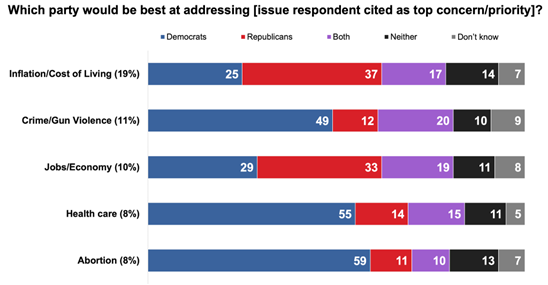
But the reality is even more complex when you dig deeper into the issues and ask about specific facets of broader areas like the economy and health care. It gives Democrats an edge in nearly every area. The question is whether their outreach to these voters will happen and allow them to capitalize on said edge:
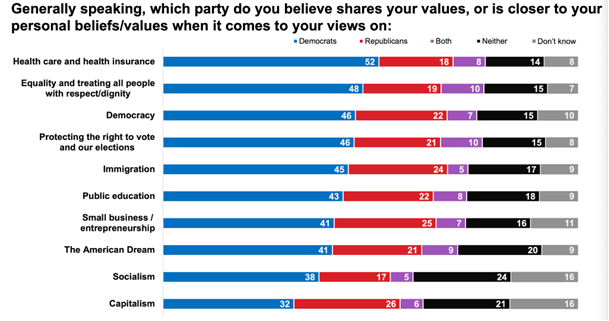
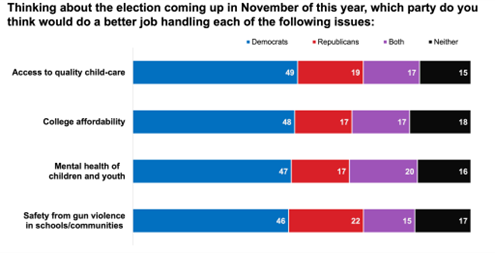
The results of this research paint a clear picture that both parties need to do more to better engage and understand Hispanic voters, and the media needs to do more than surface-level reporting to fully grasp the views of Latino voters.
UnidosUS and Mi Familia Vota are challenging the misconceptions about our multiracial voting community. We’re working to break the boom and bust cycle of Latino voter engagement by the major political parties.